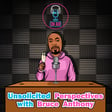
William Freeman & The Birth of Profit Prisons With Dr. Robin Bernstein
American history, slavery, capitalism, and the origins of America’s prison-for-profit system collide in this powerful episode of the Unsolicited Perspectives Podcast. Bruce Anthony interviews Dr. Robin Bernstein about her book Freeman's Challenge: The Murder that Shook America's Original Prison for Profit. Dr. Bernstein uncovers the true story of William Freeman, revealing how prison for profit, racial control, and mass incarceration grew directly out of slavery. Dr. Bernstein shares the research, family history, and discoveries that led her to William Freeman — a Black man whose wrongful imprisonment, brutal injury, and legal battle expose the roots of the carceral state, Auburn Prison, and early prison capitalism. She breaks down the history schools never taught: indentured servitude, gradual emancipation, white supremacy in law, and the racial dynamics that shaped modern prisons. This conversation connects 19th-century injustice to today’s policies, punishment, and profit — while also pointing toward hope, activism, and teaching a more honest American story.
If you care about Black history, mass incarceration, racial justice, or truthful American history, this is a must-watch.
👉 If this episode challenges you, share it with someone who only learned the “safe” version of U.S. history. #americanhistory #MassIncarceration #blackhistory #prisonindustrialcomplex #unsolicitedperspectives
🔔 Hit that subscribe and notification button for weekly content that bridges the past to the future with passion and perspective. Thumbs up if we’re hitting the right notes! Let’s get the conversation rolling—drop a comment and let’s chat about today’s topics.
🚨 Get access to the Uncensored conversations — raw, unfiltered, and unapologetically bold.
💥 Tap in for exclusive episodes, spicy extras, and behind-the-scenes chaos you won’t find anywhere else:
🔓 Unlock it on YouTube Memberships: https://www.youtube.com/channel/UCL4HuzYPchKvoajwR9MLxSQ/join
💸 Back us on Patreon: patreon.com/unsolicitedperspectives
This isn’t just content. It’s a movement.
Don’t just watch — be part of it.
Thank you for tuning into Unsolicited Perspectives with Bruce Anthony. Let's continue the conversation in the comments and remember, stay engaged, stay informed, and always keep an open mind. See you in the next episode!
#podcast #mentalhealth #relationships #currentevents #popculture #fyp #trending #SocialCommentary
Chapters:
00:00 Framing America’s Racial History and Carceral Origins 📜🏛️🔥 00:19 Welcome to Unsolicited Perspectives 🎙️🔥 00:48 Introducing Dr. Robin Bernstein and Her Scholarship 👩🏽🏫📚✨ 02:17 What Sparked a Life Studying Race in America? 🧠📚🌱 03:14 Childhood Clues That Shaped a Historian 🪞📖💡 06:14 Interpreting Roots and Early Understandings of Slavery 📺⚖️📜 08:53 Family Legacy, Progressivism & Moral Courage 🕊️🧬✨ 13:53 Uncovering William Freeman’s Significance in History 🔎🕰️⚖️ 22:02 The Emergence of the Prison-for-Profit Model in Auburn 💰🏛️📉 28:14 Auburn Prison and the Institutionalization of “State Slavery” 🔗🏭📘 32:36 Capitalism’s Structural Role in Early U.S. Incarceration 🏗️💵📚 33:41 A Teenager Enters the System That Broke Him 😔🔒👂 35:35 Indentured Servitude and the Slow End of Northern Slavery 📝⛓️🕰️ 38:38 Violence, Trauma, and the Consequences of Forced Labor ⚒️💥😔 40:56 The Fight for Wages Stolen Behind Prison Walls 💸🚫🗣️ 43:03 White Civic Identity and the Defense of Carceral Capitalism 🏛️🤝📜 46:26 Echoes of the Past in Today’s Justice Debates 🔁🚓⚖️ 58:04 Why Hope Still Lives in the Fight for Change ✊🏽✨🌍 www.unsolictedperspectives.com
Beat Provided By https://freebeats.io Produced By White Hot
